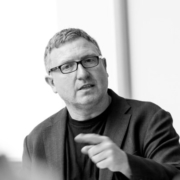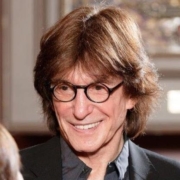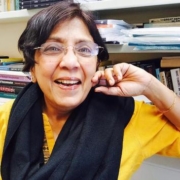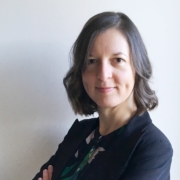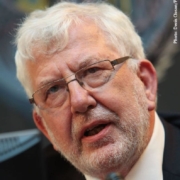Ritesh Shah and Francine Menashy
Reimagining education in emergencies
Today we try to reimagine education in emergencies. With me are Ritesh Shah and Francine Menashy. They have recently co-edited a special Forum for the journal Compare which put practitioners and scholars in conversation about the “colonial imperialist, racialized, and capitalist logics” that underpin the field of education in emergencies, known as EiE.
Ritesh Shah is a senior lecturer in the faculty of education and social work at the University of Auckland and Francine Menashy is an associate professor at the Ontario Institute for Studies in Education at the University of Toronto. Their new Compare Forum is entitled “Reimagining education in emergencies: a conversation between practitioners and scholars.”
Citation: Shah, Ritesh, Menashy, Francine with Will Brehm, FreshEd, 378, podcast audio, December 16, 2024. https://freshedpodcast.com/380-shah-menashy/
Will Brehm 0:30
Ritesh Shah and Francine Menashy, welcome to FreshEd.
Francine Menashy 1:49
Hi, Will.
Ritesh Shah 1:50
Thanks, Will.
Will Brehm 1:51
So, congrats on this new piece in the Compare Forum. It’s really quite provocative and timely. And I feel like since 2020, or so the Inter-agency Network for Education in Emergencies, has really acknowledged how it contributes to, quote, unquote, white supremacy culture. And I think, Francine, you were on the show before to talk a little bit about this and really point out issues of institutional racism at INEE as it’s known. So, I guess, you know, Ritesh, since 2020, since INEE, has sort of acknowledged some of these issues, this institutional racism, has there been any change?
Ritesh Shah 2:26
Yes and no. So, in terms of, has there been some change? Yes, but I think the thing that we were trying to provoke and prompt in our Forum piece was to argue enough hasn’t been done so far and more could be. So, just to kind of give you a bit of context -so, after they released that really kind of bold and ambitious statement, they did support a number of consultancies and reviews about how it could become an antiracist network. And it’s interesting because only last year, or actually this year, they released recommendations from the initial review that was conducted. And what was interesting is, if you look at some of the recommendations from the review, you can see there’s still a lot of work to be done. Things such as moving away from white-only stages and spaces where only those from the minority world are positioned as the experts, and where it’s also harder for the majority world to engage ensuring that antiracism forms the crux for all of INEE’s work, rather than just an add-on element, exploring a different structural arrangement in both the role interests and agendas of the leadership structure of INEE, as well as how INEE is hosted at present. And then lastly, decentering power decision making and resources away from the Secretariat of INEE, who remain, I mean, if we’re honest, largely located and shaped minority world interests and agendas. And specifically, I think, what kind of prompted Francine and I to kind of develop this Forum was the release of INEE’s new strategic framework, and it was sent out for consultation to members early on in the year, and one of the things we observed when it came out was really a notable absence of real, clear, concrete, tangible actions in relation to this statement. So, while it acknowledged the importance of the statement in the framework in terms of what INEE was actually going to do to kind of further the conversation and further the process of change within INEE and with its wide membership, it was very much lacking. And so, this was really a starting point for us to engage, not just the two of us, but a number of colleagues who are working, or have worked, as practitioners, those who are working as scholars in the field of education and emergencies, to say, given where we are now, what more can be done? How do we imagine INEE as a different and new space? And that was really the intent and idea behind the Forum, and one that we’re hoping won’t end with the Forum piece, but kind of continuing to an ongoing dialog and also provoke further processes of change within INEE.
Will Brehm 5:07
And where exactly is INEE sort of located geographically? Like where’s the Secretariat located?
Ritesh Shah 5:14
They’re kind of scattered between the United States, Geneva and other parts of the Global North -if we want to call it that. I will say that one of the things INEE has tried to do is to shift some of the roles of things like coordinators and language facilitators, so there are more individuals who are part of the Secretariat who are from the majority world. But still, if we think about the kind of locus of power and the key leadership roles, most of them have been based in the minority world.
Will Brehm 5:45
It’s an interesting sort of case study to look at within this broader education in emergencies sort of field, and I guess within that field, Ritesh, you know, what are some of the major logics that you think underpin education and emergencies that you know you find particularly problematic?
Ritesh Shah 6:02
Well, our Forum kind of builds, actually, on work of other scholars in this respect, and so I don’t want to claim these as our own arguments. And you know, this has been discussed by a number of scholars, but I think some of the things that we try to highlight in the Forum, in our introduction is, for example, this presentation of education as an unmitigated good. We often see in the kind of promotional materials that INEE and its members produce that education’s positive face is portrayed. This idea that education is a place of protection that saves and sustains lives, enables young people to build a better future for themselves. And yes, while that often is true and may be true, there are also a number of scholars who have demonstrated over a couple decades now that education can also perpetuate and sustain structural and indirect violence in how it is provisioned, delivered, governed. And these sides of education are often glossed over in the drive to fundraise and advocate for education in times of crisis and conflict. And we see this as like a willful blind spot that’s driven by other agendas. I think the other aspect of this is there continues to be a short termism driven largely by the drive to get young people into some form of education, oftentimes institutionalized education, and really this is done without considerations of relevance or quality. So, again, in research that I’ve done across a range of contexts, I’ve seen a large amount of resources getting learners into some form of accredited learning without any sort of consideration for the wider political economy within which education exists. So, if we think specifically about, for example, refugee learners, mainly located in neighboring countries and where they live, in context of legal, economic, social precarity, an education that is accredited institutionalized has very limited ability to offer social mobility and often inflicts more violence on these learners through, you know, processes of xenophobia, racism, violence, active exclusion. And then I think the third element of it is that there continues to be a drive to kind of respond quickly and immediately, and so what that means is that programs are often parachuted in from one emergency context to another based on this evidence base of best practice. But I think what the problem is with this is that it oftentimes ignores what has and continues to go on in the absence of outside intervention and assumes that those on the outside know what is best or necessary. So, we’ve seen this kind of proliferation of toolkits, guidance notes, standards that are really meant to try to standardize the design and delivery of programs around these international best practices. And what was really fascinating about is actually, if we look at the what’s in these international best practices, and we were to hold a mirror to ourselves in the minority world and to look at our own schools and classrooms, many of our systems and structures wouldn’t meet those best practice standards, either. So, it’s this real teleological modernist view that there is a right way to do things, and we know the answer.
Francine Menashy 6:12
Just to add about INEE, I do think that there have been some notable changes, and one that I’m especially hopeful for is they very recently announced a new director, Dr. Faiza Hassan, who is going to be stepping in in January 2025. She is a woman from the Global South, and she brings a great deal of experience from around the world. And you know, I mean, I’m hopeful that her leadership might usher in a new era for INEE.
Will Brehm 9:54
What I think is so fascinating about the Inter-agency Network for Education in Emergencies is that it seems rather self-reflective. I think you know, the two of you are involved, the people that were in this Compare Forum were involved, and you’re tackling some really difficult issues that a lot of organizations and institutions sort of shy away from. And I think Francine, that’s what you sort of showed in some of your other work previously. But I guess the question based on some of those logics that Ritesh brought up around education as being positive, and some of these actions being really, you know, short termism and based on best practices that are parachuted in, quote, unquote, it raises the question of, can education in emergencies and the work that INEE does, can it be impartial?
Francine Menashy 10:38
So, impartiality is one of the major tenets of humanitarianism and humanitarian action. It’s really grounded in this idea that humanitarian actors should help people irrespective of their side in an armed conflict. I think that’s at the core of it. But it lends itself to this idea that humanitarians should be neutral. But in EiE, what we’ve found, what many people have found, researchers, activists, is that EiE activities have been frequently tied to the geopolitical and economic interests of donors. So, just for example, funding for crises is very uneven. It doesn’t match often with actual need, but instead it matches with the interests and the agendas of the donors. So, a key example of this was donor support to education in Afghanistan for decades, which was very politicized. We also see how race plays into decision making and public support, and an example of this was the influx of aid and funding to Ukraine, with its White majority population, when so many other EiE contexts were being completely underfunded. And the contributors in the Forum really scrutinized this notion of impartiality. So, for example, Lisa Chung Bender, she argues that neutrality is a myth, and to claim otherwise can be harmful, because, as Ritesh mentioned earlier, because we really need to acknowledge that education can contribute to conflict, to power inequities. And also in their Forum piece, Maha Shuayb and Zeena Zakharia provide the example of the recent suspension of UNRWA funding in Palestine as a very clear example of the politicization of educational aid. So, there’s a lot of evidence to show that EiE isn’t impartial.
Will Brehm 12:30
I interviewed a scholar named Jamie Martin a couple years ago. He wrote a book called The Meddlers. Whenever I think of humanitarianism, even though he was writing about sort of the post-world war one period, you can see a lot of meddling in foreign affairs through humanitarianism, and it just raises, I guess, this question, you know, maybe Francine, I’ll ask you about; to what extent is this sort of neo colonization? We hear this term a lot these days, but you know, to what extent is humanitarianism and EiE specifically, sort of contributing to this sort of new civilizing mission of spreading, you know, morality around the world and certain political and economic interests.
Francine Menashy 13:10
So, I don’t think you’d be able to find a humanitarian organization that would claim that they’re on a civilizing mission. But I do think that there’s certainly a Northern driven ideal of what education and other social policies ought to look like, especially in crisis affected contexts. So, we -Ritesh and I and other authors in the Forum- critique this as reproducing colonial hierarchies and tied to this racial hierarchies. So, as some examples from the Forum, Lyndsay Bird points out how the whole structure of international aid supports colonial attitudes, and how this framing leads to a resistance on the part of funders, and particularly from the Global North, a resistance to trust local partners and communities living in settings of crisis. Armando Ali also discusses the need to more seriously localize efforts. Julie Chinnery gives examples of how local expertise has been ignored in EiE responses. And again, Shuayb and Zakharia explain how this colonial mindset really stifles diversity in education approaches, in learning methods and in research, and instead, it imposes universal models that really fail to account for contextual nuances.
Will Brehm 14:29
It seems like a pretty real tension, right? The issue between contextualization and localization on the one hand, and then on the other hand, an organization or a field that is working globally, right, and has these global actors. And it just seems like that tension is going to be inherent no matter what happens.
Ritesh Shah 14:48
Yeah, absolutely. I mean, I think there is a discourse, especially in the humanitarian sector, around localization. We see this, for example, in -and what localization effectively is supposed to be, is this idea of shifting power and resources to actors and institutions with the lived experience. Those working on the ground in the context of the emergency. But what’s interesting is that there’s a tension there, because what this is all about is ceding power, expertise, control to the local actors. And what Julie Chinnery wrote in her reflection is how, even in the context of Ukraine, where there was significant amount of expertise, it was a minority world context, you know, full of educated Europeans who were already doing work in terms of education in emergency response, there was still a desire to kind of transform local ways into Western humanitarian models. So, this kind of globalizing force came in and sought to really transform it. And what she argued was needlessly bureaucratize and formalize systems that don’t need to be. What was also interesting is like the one exception, she noted, was when the international community deployed these ideas of mini-grants, where effectively it was just a form of direct aid to local communities or to local partners to basically lead their own responses. And this is something that Lyndsay Bird is really advocating for in her Forum piece as well -is this idea of direct aid. But this requires a level of trust on the part of funders and for affected populations to really lead their own responses. And what Julie reflects on is the fact that there appears still to be very little appetite for this type of work to be occurring. So, there’s that constant tension of, yes, we want local expertise, and we want this to be locally driven, but we want to have control over the narrative of this.
Will Brehm 16:43
Is there also, sort of the interests of capital here? I would imagine sending money locally to communities to sort of then do what they want with you know, as Lyndsay Bird points out, as being a really positive way of doing this potentially means that some of the big companies that are working in humanitarianism wouldn’t get that capital flow right? Like they wouldn’t be the ones that are getting the contract to go and deliver whatever aid it is. So, I guess, to what extent is issues of capitalism and humanitarianism as an industry implicated in some of these issues that we see as well?
Ritesh Shah 17:17
I would say 100%. I’d say that it is an industrial complex humanitarianism. And in terms of EiE -we point to a few examples of this in our Forum piece, but it’s also discussed in other places as well- things such as, if we look at how some of the big organizations are fundraising, how they kind of pedal on misery and trauma as a mechanism to raise funds and to really use that as a way to sustain their operation. As Francine has already mentioned, this idea that these organizations will follow the agendas and interests of the donors and funders, so that basically their work follows where capital flows, rather than where the need is. And then I think, thirdly and again, this is something highlighted by a couple of our Forum contributors, is that there is a real sense of labor exploitation in some of what is happening within the humanitarian industry and specifically education in emergencies. So, for example, locally engaged staff are oftentimes the experts and hold that institutional knowledge, but they actually are put on the front line with little protection. They have different security protocols. They don’t receive the same kind of entitlements of housing and benefits that the international staff do, and end up oftentimes risking their lives and livelihoods to deliver the programming that’s designed in headquarters somewhere else. And even worse than that are things like the use of volunteer teachers, who are often displaced individuals, and are often used to really deliver programs with great efficiency because they can be paid pittance because they use the kind of labor schemes that where their refugees are restricted from working to then use these teachers to basically deliver programs, and then to kind of have them move from program to program with little long-term security for their work.
Will Brehm 19:17
All of these really big issues that you’re bringing up with race and colonialism and capitalism and some of these really clear tensions that then play out on the ground vis a vis humanitarianism and education in emergencies in particular. You know, I guess your piece is so timely, because you sort of are calling for reimagining what this might look like. And so, you know, Francine, I guess, given some of these structural issues that we’ve been talking about, is it even possible, do you think, to sort of overcome some of these challenges?
Francine Menashy 19:46
So, this is really the debate that we elicited in the Forum. So, in our introductory piece, we ask the contributors directly to answer the question, what’s required to reimagine education in emergencies where those who have been historically excluded from meaningful engagement with EiE systems, with their structures, their institutions, can now sit at the center. And we quote Audre Lorde, and we ask if we should really take seriously her notion that the master’s tools will never dismantle the master’s house -meaning, should we really just dismantle the entire current EiE sector and rebuild it anew? Or can we recognize that, yes, it has some flaws, but the EiE sector as it exists today holds some inherent value, and particular reforms might allow for more just and equitable practices. And the contributors to the Forum seem to be quite split on this. They express different views. To be honest, I’m not sure how I personally feel. It depends on the day how cynical I am.
Will Brehm 20:56
How do you feel today?
Francine Menashy 20:57
Today, I feel pretty cynical. I feel like we’re having a conversation right now, honestly, about something so deep and structural that requires global actors to be at a starting point of caring. And I don’t know. I look around the world and I see what’s happening in countries all over moving farther and farther to the right, including in my country, in Canada. I feel that leaders and populations are becoming more territorial and nationalistic and caring less and less about anyone who doesn’t affect them or look like them. And so, my very sad response is, I don’t even know if we’re at a place where the current EiE structure can even continue. I think we’re losing a lot of funding. I foresee a lot of funding loss and a lot of lack of public support, which is what we need as even just a starting point before we can have a conversation around restructuring. So, that’s how I am today.
Will Brehm 22:09
Ritesh, how are you feeling today? Like, is it possible to reimagine with the existing structures, or do we need to knock down the structures completely and build anew?
Ritesh Shah 22:20
I guess I also oscillate in terms of my view from day-to -ay. At the moment, I probably feel similarly to Francine. I’m not convinced that we can work within the structures we have and try to reform from the inside. At the same time, I don’t want to give up hope. I don’t want to give up the sense that maybe it’s worth a try. And I think, as Francine has noted, there are some recent positive developments that INEE is taking in this respect. I think they are trying to be more self-reflective, and I think they’ve responded quite positively to some of the criticisms that we’ve raised, and tried to continue and enter into dialog on. So, for example, they’re going to create a reference group that’s going to look at, how do we take some of these conversations forward? I guess it’s yet to be seen whether or not that will involve also, then thinking about how to disentangle some of these problematic structures and systems and self-interest that sit at the core of this from the core idea of humanity, which I think is what’s been lost. You know, we have to remember that humanitarianism is about this idea of a common humanity. And I think somehow along the way, we have become so separated from that concept that I’m not sure we can come back to that point.
Will Brehm 23:35
Looking backwards to some one worldism of the 1930s or whatever -1920s 1940s- is perhaps a bit naive, but some new form of internationalism might be needed, both sort of intellectually as an idea, but then structurally as sort of the global architecture as we know it. It just seems like, potentially, the current existing global architecture isn’t fit for purpose currently, and it’s a matter of where do we tweak, or where do we rebuild?
Ritesh Shah 24:04
If I would just add to that, Will, I mean, I think it’s probably beyond tweaking, because I think we need to recognize that that architecture came about at a particular epoch and moment in our global history -one that we’ve moved beyond. And so, we need to kind of not just tinker around the edges, but actually do some more fundamental changing around.
Will Brehm 24:25
And I guess this is where you know this issue, Ritesh, you brought up of like, self-reflection, and it comes up in the Compare Forum that you put together. Francine, is there a limit to self-reflection? Like, it’s good to reflect, of course, but does that just then let us tinker at the edges and sort of miss some of these much larger issues. I struggle with self-reflection as sort of the end all way of changing a system.
Francine Menashy 24:48
Yeah. And I would agree that there are certainly limits, but I do think it’s a key component. We saw this in the Forum. We had practitioners of different professional backgrounds from around the world, and something they all agreed on was the need to reflect and think about themselves and ourselves, our positions, the roles we play, in the context of EiE, especially relating to power hierarchies. And in fact, the Forum, I think of it, it is a space of self-reflection -that’s what it does. Where I think most of the contributors talk about how they personally have contributed to these inequities, including me and Ritesh. We discuss that too and how we hope to change. The contributors explain that this process of self-reflection can do quite a lot. It can challenge cultures of white saviorism and racism in the sector, but they also recognize that it might mean ceding power and control to people who have been marginalized, to those who are now locally situated actors and experts. It might just be a first step, but I think it’s a key steppingstone if we want to make real change.
Ritesh Shah 26:03
If I would just add to that, I think for me, the notion of self-reflection isn’t just to self-reflect, but I also think it serves an important act of reminding ourselves how we have agency in these kinds of big questions. Because yes, it can feel really overwhelming about how do we make change within these systems and structures which seem so overbearing? But on the other hand, I do feel that there are those spaces, and there are these individuals who are doing this work. And I think if we were to collectively work together and think about new forms of solidarity, I think that’s where there’s spaces for change.
Will Brehm 26:41
The other thing that I think about self-reflection, in a way, building on what you both have just said, is, you know, it does put the human back into it, and it puts the humans interacting with one another into it, which then means that there’s sort of a politics to it, which is very different from that technical solution, best practice approach, which is, you know, almost dehumanizing. It’s really not about the humans implementing any of this. It’s just getting the right technical approach correct. But you know, I guess I struggle with that. I feel like we live in this era right now where technical solutions are so powerful and there’s so much money and effort going into finding, you know, the best way to read, the best way to teach writing, the best way to do math. And, you know, it’s definitely not an issue just in education in emergencies. I think it’s a broader phenomenon. But I guess, Ritesh, how do you challenge some of that sort of technical solutionism?
Ritesh Shah 27:38
I think it’s doing exactly what you said, Will, which is remind ourselves that education is inherently a political act, and reminding ourselves that if we were to just open up that black box of education, we would come to see very quickly that it’s a messy one. It’s full of complexities, and it’s not even bounded by the education system itself, right? So, it’s linked to wider social, political, economic projects that we have to locate and acknowledge our work is situated in. So, that includes histories and legacies of capitalism, racism, imperialism, Empire and then what that means, then is recognizing that undoing and unpicking that isn’t just something that we can tick a box off once and it’s done, but it’s actually a process that requires kind of constant reflexivity, self-criticality, but also a number of, I would say, small and big actions that are focused on material, epistemic, pedagogical repairs Arathi Sri Prakash has talked about. And I think this is a continuous journey, and we’re not going to arrive one day and say, ta da, we’re antiracist now, and we’ve broken away from the colonial legacy. It’s something that we are going to need to be working on for generations to come.
Will Brehm 28:56
And, you know, maybe to end, Francine in the piece, someone, I forget exactly who brought it up, but they talked about, you know, moving towards this notion of a politics of solidarity. I find that really beautiful, but I would love to just sort of hear from you, like, what would it take to do that, in your opinion?
Francine Menashy 29:13
So, that was Maha Shuayb and Zeena Zakharia, whose piece tackles this beautifully, where they discuss what’s more common, which is this politics of saviorism and explain how it’s really unlikely to address injustice or to nurture any kind of liberation. They commit, instead, to this politics of solidarity that rejects the harm that’s been done to education communities. So, this notion of solidarity, it’s attentive to all the unequal power that we see in EiE. It reorients the structures in EiE to center communities, and repositions EiE actors in the Global North into complementary roles, right, more peripheral roles. A politics of solidarity also seeks to learn from and support diverse forms of resistance and struggle in education, going really firmly against this idea that it’s apolitical. And they discuss solidarity themselves as researchers, but I think it can extend to all forms of EiE engagement. It’s a total reorientation but I do believe it can happen.
Ritesh Shah 30:24
And I think this is exactly the project that Francine and I are trying to commit ourselves to, as well, is creating and nurturing those politics of solidarity and continuing to grow that space. And so, our hope is actually that the Forum continues to kind of create that space and that we can use this as a starting point or a continuous point to build that process and build those politics of solidarity.
Will Brehm 30:51
Well, Ritesh Shah and Francine Menashy, thank you so much for joining FreshEd and I look forward to working with you on this politics of solidarity.
Francine Menashy 30:58
Thanks for having us.
Ritesh Shah 31:00
Thanks, Will.
Want to help translate this show? Please contact info@freshedpodcast.com
Related Guest Publications/Projects
Reimagining education in emergencies: A conversation with practitioners and scholars
Education in emergencies research partnerships through the looking glass
Reconsidering partnerships in education in emergencies
Promising partnership models for education in emergencies: A global-local analysis
Policy networks in refugee education
International aid to education: Power dynamics in an era of partnership
The rise of resilience in education in emergencies
Mentioned
INEE minimum standards anti-racism and decolonisation thematic review findings
List of countries suspending and reinstating UNRWA funding
Recommended
The imperial entanglements of “Education in Emergencies”
Humanitarian action in international relations: Power and politics
The role of humanitarian aid and neutrality in protracting civil wars
Twenty years of the INEE: Towards a new ontology and epistemology
Critiquing the conceptualisation of education as humanitarian aid
Unequal partners? Networks, centrality and aid to international education
Education in emergencies: A review of theory and research
Uneven distribution of funding for crisis based on donor support
Navigating narratives in Ukraine: Humanitarian response amid solidarity and resistance
A critical race theory analysis of international response to the Ukrainian refugee crisis
Humanitarian localisation: Can we put values into practice?
International humanitarian organization’s perspective sin localization efforts
The humanitarian industrial complex and the criminalisation of solidarity
The local labour building the international community: Precarious work within humanitarian spaces
Re-reading refugee education response through an anticolonial discursive framework
Have any useful resources related to this show? Please send them to info@freshedpodcast.com

